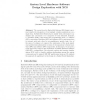Free Online Productivity Tools
i2Speak
i2Symbol
i2OCR
iTex2Img
iWeb2Print
iWeb2Shot
i2Type
iPdf2Split
iPdf2Merge
i2Bopomofo
i2Arabic
i2Style
i2Image
i2PDF
iLatex2Rtf
Sci2ools
117
click to vote
GECCO
2004
Springer
2004
Springer
System Level Hardware-Software Design Exploration with XCS
Abstract. The current trend in Embedded Systems (ES) design is moving towards the integration of increasingly complex applications on a single chip. An Embedded System has to satisfy both performance constraints and cost limits; it is composed of both dedicated elements, i.e. hardware (HW) components, and programmable units, i.e. software (SW) components, Hardware (HW) and software (SW) components have to interact with each other for accomplishing a specific task. One of the aims of codesign is to support the exploration of the most significant architectural alternatives in terms of decomposition between hardware (HW) and software (SW) components. In this paper, we propose a novel approach to support the exploration of feasible hardware-software (HW-SW ) configurations. The approach exploits the learning classifier system XCS both to identify existing relationships among the system components and to support HW-SW partitioning decisions. We validate the approach by applying it to th...
Related Content
| Added | 01 Jul 2010 |
| Updated | 01 Jul 2010 |
| Type | Conference |
| Year | 2004 |
| Where | GECCO |
| Authors | Fabrizio Ferrandi, Pier Luca Lanzi, Donatella Sciuto |
Comments (0)

